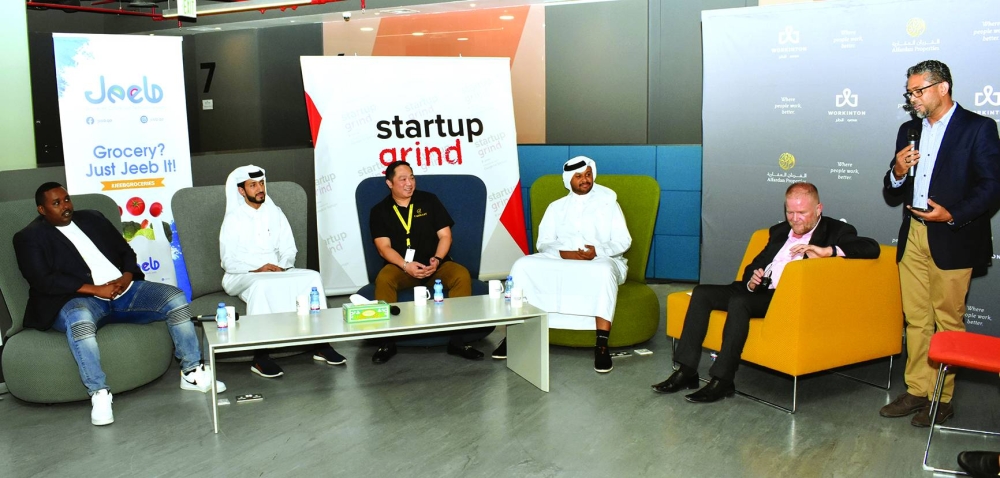Innovations in financial technology (fintech) will continue to drive better user experience and safe transactions, among other solutions, being offered by tech startups in the local market.
This was among the varied topics discussed by a panel of fintech startup founders based in Qatar during Startup Grind Doha Chapter’s regular discussion titled ‘What’s Next for Fintech Startups in Qatar’, which was held recently.
Moderated by Business Start Up Qatar CEO and founder Steve Mackie, the panel was composed of Ahmed Isse, co-founder of Dibsy; Mohamed al-Delaimi, founder and managing director of SkipCash; Michael Javier, CEO and founder of CWallet; and Mohamed Suleiman, co-founder of Karty.
According to Isse, “one of the biggest trends that happened in Qatar” is one-click payment solutions like Apple Pay, Google Pay, and Samsung Pay, among others. He noted that Dibsy is also focusing on fraud prevention, citing the use of machine learning to address the issue.
Isse also underscored the importance of localisation or the knowledge of the local market, which, according to him, is how home-grown companies can add value as compared to the solutions being offered by their counterparts abroad.
“Local companies understand localisation; we might have some similarities with other international start-ups but we focus on what the user wants because the end goal is what the user wants and by focusing on localisation, that’s where we win. Big companies can come and spend as much money as they can but if they don’t understand localisation, that’s where the value is lost,” Isse stressed.
On the other hand, al-Delaimi said the general trend in fintech is that most of fintechs rely on existing capabilities, whether it is digital payment as payment gateways or data analytics for customer behaviour.
“Some of the use cases currently in the market are ‘buy now, pay later’, crowdfunding, and insurance technology. These are actually built on existing solutions and capabilities provided by other fintechs.
“Each fintech technology is going to fulfil certain use cases that provide a good customer experience, so all those fintechs right now are going to target specific user or customer experiences to address their needs and keep them in the same environment,” al-Delaimi explained.
He added: “According to recent statistics, in the coming five years, 25% of all payments made in stores would be from wallets, whether it’s from Apple Pay, Google Pay, or Samsung Pay.”
For his part, Javier emphasised the importance of financial inclusion by empowering customers and giving them the freedom to dictate what they want to do with their money by offering them a wide range of services.
“What we can do is to be intimate with our customers...so, it is not the underlying technology that attracts customers but it is in the value and thought process,” Javier explained, adding that aside from localisation, startups and fintechs should also disrupt the market, citing the business models of Grab, Uber, and Airbnb, among others.
Suleiman pointed out that while scaling locally or in international markets has its challenges for startups, localisation and understanding the market and the needs of potential customers and businesses is a key factor.
“We live in a world that is ‘hyper-personalised’, so it is important to deliver the value that is connected to the needs of your customers, which is why localisation and a better understanding of the market add value,” he explained.
Speaking to Gulf Times on the sidelines of the event, Startup Grind Doha chapter director Indica Amarasinghe said: “The whole objective of Startup Grind is to bring the ecosystem in Qatar together. While this creates an opening for everyone to learn from each other, it also leads to invaluable networking opportunities.
He added: “During the panel discussion, there were great insights shared by fintech startups in Qatar. The audience engagement showed the level of interest and confirmed the necessity for events like these. The fact that we had over 90 people attending is a great testament to Startup Grind Doha and also to the startup ecosystem in Qatar.”

Startup Grind Doha chapter director Indica Amarasinghe (standing) introduces the panel of experts during a discussion on the fintech industry in Qatar. From left are Ahmed Isse, co-founder of Dibsy; Mohamed al-Delaimi, founder and managing director of SkipCash; Michael Javier, CEO and founder of CWallet; Mohamed Suleiman, co-founder of Karty; and Steve Mackie, CEO and founder of Business Start Up Qatar. PICTURE: Thajudheen

